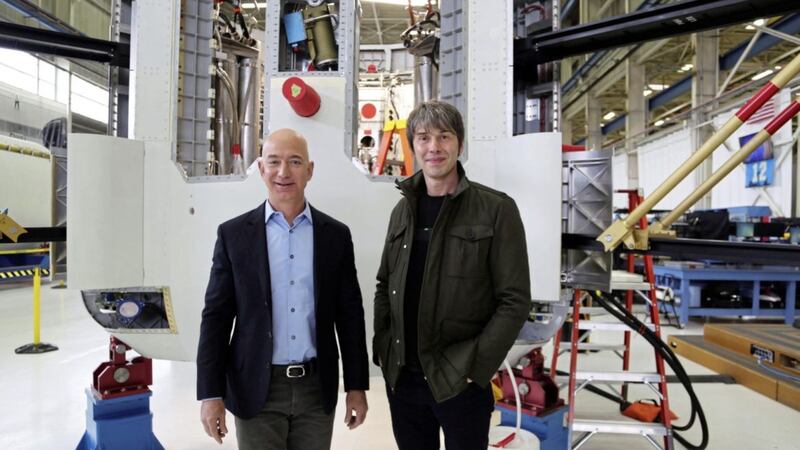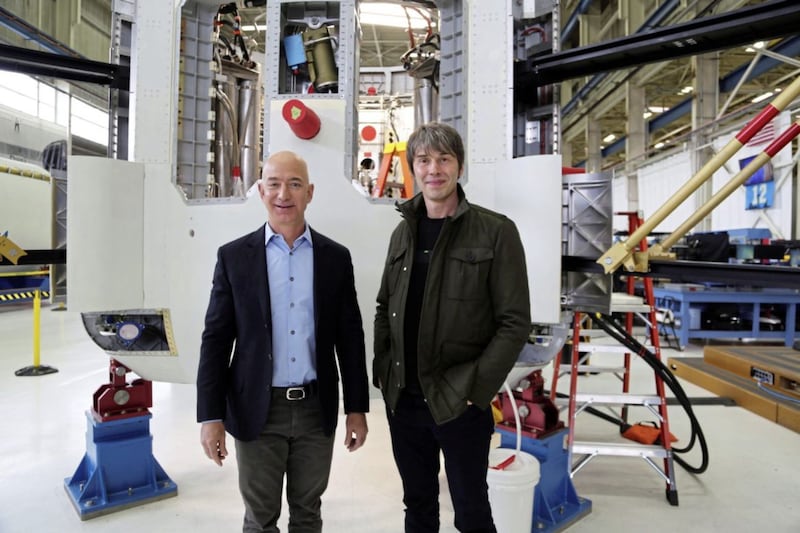Twenty First Century Race For Space, BBC 2, Wednesday at 11.15pm
“Move heavy industry off Earth and zone Earth as residential. Space is just a better place to do heavy manufacturing,” Jeff Bezos said with the confidence of a billionaire.
I guess that’s the kind of future planning you do when you’ve launched one of the world’s biggest companies from your front room.
Bezos isn’t putting Amazon to one side but you get the impression that he’s really energised by the idea of creating a zone to live and work in space.
His company, Blue Origin, makes its own rockets and is already transporting commercial satellites to space, but his stated aim is to bring people to the rest of the solar system.
His dream is that Earth is protected from further ecological damage by moving industry, mining and manufacturing out into space and keeping the home planet as a beautiful place to live.
It also means that if there is nuclear war or a mega virus then people on other colonies survive and the human race continues.
Bezos is spending $1 billion a year of his own money on the project but when you’ve got an estimated $80 billion in the bank you can afford the risk.
It’s perhaps not surprising that it’s the super rich who are funding the next wave of space exploration.
Governments, with perhaps the exception of China, are drowning in debt and the demands from their electorates are for better healthcare not for an astronaut on Mars.
It was inter-state rivalry of the cold war which brought the last great breakthrough in space exploration when the US and the USSR didn’t care what it cost to get one up on the other.
Now, with Brian Cox as our guide, we meet Bezos, Richard Branson and a representative of Elon Musk, another tech billionaire (PayPal) who has dreams beyond the gravitational pull of Earth.
Musk, with his company Space X, has a plan for a reusable rocket which he says will bring people to Mars within five years. And remember the flying time alone is 12 months.
Virgin founder, Richard Branson is the most established of the super rich space players. Virgin Galactic has been going for more than a decade and has signed up 700 customers at $250,000 each for a trip to space.
An accident during testing in 2014 put things back, although Branson hopes to take his first customers 10kms above the earth (the agreed definition of space) later this year.
However, things have moved on a bit since Branson decided to try and move Virgin into space tourism. Now private companies are dreaming about going to space to harvest its resources.
Deep Space Industries and Planetary Resources have plans to land on an asteroid and mine it for metals and minerals.
It may sound a bit far fetched, but there are already 1,400 satellites orbiting earth and 30 probes have been sent out to investigate the other planets in the solar system. In 2014 Nasa even landed a craft on an asteroid.
“I find it really exciting and energising,” said Cox.
So was his programme.
****
Mountain: Life at the Extremes, BBC 2, Wednesday at 9pm
When you think of the Himalayas you think of Everest, you don’t think of a marathon.
In the second episode of this nature/natural history series we visited the most magnificent mountain range on the planet.
But we also got to meet athletes who run a marathon which begins at 5,000 metres above sea level.
I’ve been above 4,000 metres once and I could hardly stand up, was short of breath and generally felt like someone was sitting on my chest. Running seems as unlikely as living on Mars.



